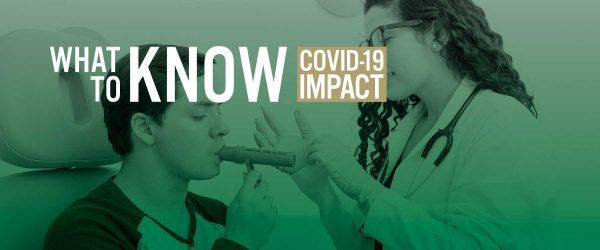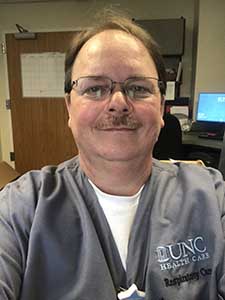Respiratory therapists on the frontlines of response to COVID-19 pandemic

As the COVID-19 pandemic is keeping many people apart, it’s bringing together those working in the field of respiratory therapy, according to John Ross, a clinical manager and respiratory therapist at UNC Health Care in Chapel Hill.
 “I am seeing teamwork like no other time,” said Ross, who is also a student in UNC Charlotte’s bachelor’s degree program for respiratory therapy, and graduating in May. “It seems to bring therapists together.
“I am seeing teamwork like no other time,” said Ross, who is also a student in UNC Charlotte’s bachelor’s degree program for respiratory therapy, and graduating in May. “It seems to bring therapists together.
“The virus not only affects those who unfortunately catch it, but it seems to amplify what you have inside of you. If you are easily frightened, then you will be very scared. More than that, I have seen the brave become braver and it seems the good are getting better. Physicians are asking for more input than ever before. The teamwork is beyond believable.”
Respiratory therapists are trained to work with patients who suffer from breathing or cardiopulmonary problems, and their role is critical in the battle to contain COVID-19.
“This virus causes an acute respiratory tract infection that creates breathing difficulties,” explained Jhaymie Cappiello, an adjunct faculty member in UNC Charlotte’s respiratory therapy program who has worked in the field for nearly 40 years. “The degree of symptoms in individuals varies. Most infected are able to stay at home until recovery. There are individuals whose symptoms worsen and they require hospitalization. It is for these patients that the respiratory care practitioner plays an important role.”
Cappiello, also an education coordinator for the Department of Respiratory Services at Duke University Medical Center, said respiratory therapists are skilled in therapeutics that help patients manage their respiratory difficulties, such as oxygen therapy and mechanical ventilation.
“This pandemic is increasing the numbers of patients who require hospitalization due to respiratory difficulty,” Cappiello said. “This increase in respiratory specific patients increases the need and value of this specialized practitioner and the resources of the respiratory care practitioner.”
Demands on the field
 Amanda Dexter, program coordinator for the University’s bachelor’s program in respiratory therapy, said respiratory therapy has been overshadowed by other medical professions, but that therapists’ expertise is now being showcased.
Amanda Dexter, program coordinator for the University’s bachelor’s program in respiratory therapy, said respiratory therapy has been overshadowed by other medical professions, but that therapists’ expertise is now being showcased.
She compares the COVID-19 pandemic to the polio epidemic because of the number of people getting sick so quickly and potentially in need of ventilators, which are in short supply.
“We’ve never had to have this many sick patients at one time in a hospital, and I think that’s where the stress level comes in,” Dexter said.
Respiratory therapists need only an associate degree to practice. But Dexter said this pandemic could lead to more people seeking the bachelor’s degree to obtain more training.
“What we’re seeing is that our national organizations are actually pushing for respiratory therapists to go back to school and have a minimum of a bachelor’s degree,” Dexter said.
She said there are about 160 students enrolled in UNC Charlotte’s respiratory therapy bachelor’s program, which typically takes two to three years to complete.
“It was obvious to me that the new normal would be a bachelor’s degree,” Ross said of why he enrolled in the program. “I also had just received a promotion and felt like I should have a degree that matched a manager position.”
Ross said safety is at the top of the list for him and his colleagues, including appropriately donning and removing personal protective equipment.
“The demands on respiratory therapists are high as they are looked upon by all disciplines as the experts on this disease,” Ross said. “We have not reached the apex yet, and the preparation is taking a toll on everyone.”
Ventilators in short supply
The number of COVID-19 patients is exceeding the number of available ventilators. Dexter is assisting a COVID-19 emergency task force made up of healthcare professionals, ventilator manufacturers and medical engineers to help determine the safety of placing two patients on one ventilator, as well as appropriately managing COVID-19 issues related to respiratory failure and rapidly deteriorating lung mechanics. Dexter said the task force is doing pretrial testing using a lung simulator that acts like a human lung and can mimic different disease states to test how effective ventilation would be.
The goal is to determine “can healthcare professionals safely manage two patients on one machine that is designed originally to read only one patient’s status,” Dexter said.